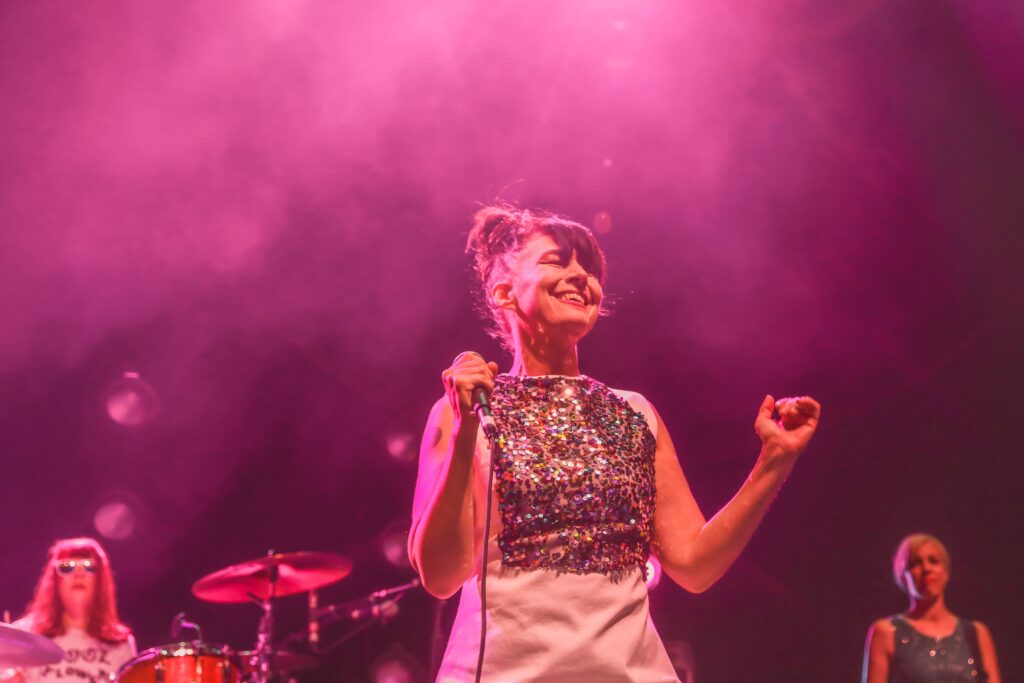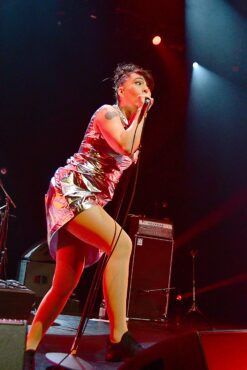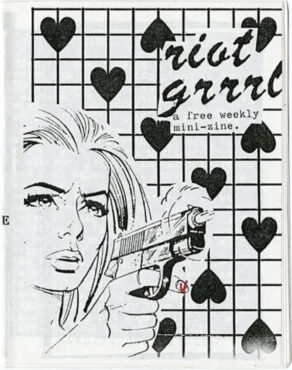
Bikini Kill – Credit: Debi Del Grande
Riot Grrrl Pioneers and feminist punk rockers Bikini Kill are finally getting back on the road after postponing their tour for two years due to COVID. Kicked off on April 29th at the Greek in LA, the band will continue through the US, Canada and Europe. Having not released an album in over 20 years, it’s a testament to the staying power and emotional resonance of their songs that a Bikini Kill tour still feels crucial in 2022. That same fire and tenacity that made them icons in the 90s still feels viscerally essential today. Human rights are being dismantled every day and the desire to fight back continues to deepen. I can’t think of a better – or more cathartic – way to deal with mounting frustrations and to inspire us to keep going, than to see a Bikini Kill show. While the upcoming Boston date was postponed due to illness, we recently had the opportunity to chat with vocalist Kathleen Hanna about vocal remedies, the evolution of Riot Grrrl and being an icon…
Allston Pudding: What are you most looking forward to on this tour?
Kathleen Hanna: Singing and being onstage [laughs]. We’ve been rehearsing every day and it’s getting funner and funner, but I’m excited to actually have an audience. I can’t imagine an audience for another month [laughs]. Just excited for the energy and seeing everybody during such a hard time. White nationalism on the rise, bodily autonomy for trans people and people who can get pregnant being eradicated, everyone besides straight rich white guys living in fear. Just to be in a room with people who wanna have a joyful time and not forget about everything but to create pockets where we are affirmed.
AP: You have a very strong and memorable vocal, do you have any go-to vocal remedies?

Kathleen Hanna – Credit: Dean Keim
KH: Yeah, I’m in my bedroom right now looking at a bunch of them. There’s these really expensive things my vocal teacher told me to get called Grether’s Pastilles. They are delicious. I eat them like dessert. A lot of singers use Ricola and I do when I’m on stage, but then you get home and you’re like, “if I ever see another Ricola, I’m gonna barf.” One time I was on tour so much for my birthday I thought they were going to bring me a Ricola cake. But, one of the best things you can do is to gargle salt water in the evening.
My vocal teacher taught me a lot, but one of the simplest things if you’re a singer is, I have a lot of vowels at the beginning of phrases that I hit very hard, like “every” or “always” and I’ll put an “H” before it. I sing the “H” away from the mic, because it protects from this thing called Glottal Strike.
Unfortunately, my vocal teacher was murdered on March 10th so it’s been very strange. I listened to her voice every day and it’s actually wonderful to hear her. I thought it was gonna make me really upset but it’s been great that she’s still with me as I re-explore all of her techniques in rehearsals. I didn’t have that in the 90s. I was breathing incorrectly. When I was in Le Tigre I started getting lessons to protect my voice and I relearned how to breathe. It changed my life. I can’t believe I made it through one show without any technique [laughs].
AP: How does it feel to be regarded as an icon?
KH: Well first of all, the word icon is so overused. I guess maybe I’m a fuddy-duddy but like, that Ricola is not iconic, my coffee mug is not iconic, stop. I just feel like whenever I read anything it’s like “oh my god, my shoes are iconic!” Guys, c’mon! I’m the icon here! [laughs] I’m kidding. No, I mean it’s nice to be acknowledged, you know? It’s nice to have people say, “oh, these bands you were in were there for me at an important time.” It’s definitely weird, like the historical part of it, like “icon” or “legend”, they make you kind of historical. Like, I’m still working. There’s something kind of frozen statue about it. Especially because I’m older. I’m not 26 anymore, but it’s like… I’m not done.
AP: Yeah, let me get where I’m going first…
KH: I feel like I’m singing better than I did in my 20s and I’m having a better time. I just wanna be another working musician… like my dog still shits in the house and I have to clean it up. So that’s what I think of when I get called an icon.
AP: In a recent interview with Dan Rather, he asked your husband Adam Horovitz about the weirdest celebrity/fame moment that he experienced. I was curious what you would’ve said?
KH: Oh, I mean I had a weird thing with Liev Schreiber [laughs]. I lived in New York for like 21 years and one day in Soho, I was running errands all day and then I was going to see a movie at the Angelica. Everywhere I went, I saw Liev Schreiber. I went to the drugstore, Liev Schreiber was there. I popped into a clothing store, Liev Schreiber was there. He had always made it to the place right before me, so by the fourth or fifth time I saw Liev and came in after him, he started looking at me like…
AP: You’re following him around [laughs].
KH: Yeah like, “oh, shit I have a stalker”, right? So I was like, how do I tell Liev Schreiber that I’m not stalking him? If I go up to him and tell him then it’s really gonna look like I’m stalking him. It was weird, like I guess we just like the same things? So, I get to the Angelica to meet Adam and I sat in the second row. I like to be down front. Adam is late and the movie is going to start so I keep turning around and turning around and turning around and fuckin’ Liev Schrieber is in the movie theater. He’s watching me turn around, he’s by himself and I can see him visibly getting uncomfortable.
AP: Did you make any sort of contact?
KH: I never said anything! Once Adam showed up, I was like please be wearing a baseball hat so you look like you’re in the Beastie Boys. So Liev will see I already have a celebrity boyfriend, and I’m not looking for one [laughs].
AP: That’s such an awkward but incredible coincidence…
KH: I had something similar with Willem Dafoe where I would run into him in a bunch of different countries at museums while on tour. But he didn’t think I was stalking him.
AP: As the person often regarded as the pioneer for the Riot Grrrl movement, what has it been like watching that movement evolve?

Example of cover art for a Riot Grrrl “zine”
KH: It’s been horrible. To be perfectly honest, and I’m not talking about right now. Basically me and Allison Wolfe called the first meeting which was supposed to be about starting a magazine for women in music and activism. It turned into a consciousness raising thing within the music scene and it was cool for a while. But it was basically one summer for me. I started to see the limitations on it, some people got involved, you know white women who were making everything about them and trying to become the victims in every situation. People being competitive about who is more oppressed. I started to not want to be involved and I can’t go to every Riot Grrrl meeting around the world and change it.
But recently I’ve seen some stuff online and now I’m really happy because the critiques about racism and inclusivity are totally spot on. I’m excited for Sista Grrrl, a group in New York started by women of color. The fact that people are like, “this isn’t for me, I’ll start my own thing.” That’s what I did. We tried to get more women playing music. But, the fact that now other people who aren’t cis-gendered white middle-class women are saying “fuck riot grrrl”, well that’s how it all started. Like “fuck this white straight male punk scene.” It’s awesome.
AP: It’s just broken and reinvented every few years.
KH: And great! I’m not like, “let’s keep it in a lock box and nostalgia-ize it to death.”
AP: With no announced plans for new Bikini Kill, Le Tigre or Julie Ruin music, are there any other projects you are working on?
KH: Me and Kathi Wilcox both participated on a record that our new guitar player Erica Dawn Lyle just put out on June 3rd on Bandcamp. Kathi did a song, I did a song, Brontez Purnell, Kelley Deal, Christina Billotte. A lot of amazing people and it’s a benefit for NEFOC, the North East Farmers of Color land trust. All proceeds go to buying land for people of color and indigenous farmers. They also lobby to corporate landholders to try and give land back to indigenous tribes. And the thing about this benefit is, I’ve heard it and it’s really fucking good. You know, most benefit records, people send in their shitty [songs], or they just sing the first thing that they think of using ProTools in their basement. But everyone really worked on this record.
Check out the new benefit album from Erica Dawn Lyle feat. Kathleen Hanna below! Stay up to date on Bikini Kill including rescheduled tour dates and more by following them on Facebook, Instagram and Twitter.
